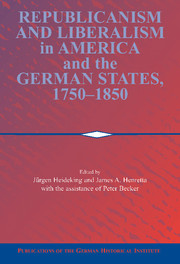Book contents
- Frontmatter
- Introduction
- PART I OVERVIEW
- PART II THE REPUBLICAN WORLD
- PART III THE TRANSITION FROM REPUBLICANISM TO LIBERALISM
- 7 The Liberal and Democratic Republicanism of the First American State Constitutions, 1776-1780
- 8 Bennington and the Green Mountain Boys: The Emergence of Liberal Democracy in Vermont, 1760-1850
- 9 The Birth of American Liberalism: New York, 1820-1860
- 10 Republicanism, Liberalism, and Market Society: Party Formation and Party Ideology in Germany and the United States, c. 1825-1850
- 11 Festive Culture and National Identity in America and Germany, 1760-1860
- 12 Charles Follen’s View of Republicanism in Germany and the United States, 1815-1840
- PART IV THE LOGIC OF LIBERALISM
- Index
10 - Republicanism, Liberalism, and Market Society: Party Formation and Party Ideology in Germany and the United States, c. 1825-1850
Published online by Cambridge University Press: 05 January 2013
- Frontmatter
- Introduction
- PART I OVERVIEW
- PART II THE REPUBLICAN WORLD
- PART III THE TRANSITION FROM REPUBLICANISM TO LIBERALISM
- 7 The Liberal and Democratic Republicanism of the First American State Constitutions, 1776-1780
- 8 Bennington and the Green Mountain Boys: The Emergence of Liberal Democracy in Vermont, 1760-1850
- 9 The Birth of American Liberalism: New York, 1820-1860
- 10 Republicanism, Liberalism, and Market Society: Party Formation and Party Ideology in Germany and the United States, c. 1825-1850
- 11 Festive Culture and National Identity in America and Germany, 1760-1860
- 12 Charles Follen’s View of Republicanism in Germany and the United States, 1815-1840
- PART IV THE LOGIC OF LIBERALISM
- Index
Summary
Republicanism and liberalism were born as ideas - or rather, as complex webs of ideas - that began to attract people of the privileged classes in the early modern era. But they eventually succeeded in deeply penetrating Western societies and political systems only after they turned into parties: Political ideologies crystallized as, or allied themselves to, social networks and movements that, in a more or less formalized structure, strove for power and in that quest competed with other ideological movements. Whereas previous historical scholarship on party formation had concerned itself either with the history of ideas alone or with the emergence and mechanisms of party organization in what could be called an institutional approach - a tendency particularly strong in Germany but also present in the United States - recent research in both countries has focused on the complex and fascinating links between ideology and political structure.
From the vantage point of intellectual history, for example, it turned out that ideologies such as liberalism or republicanism were not neatly defined concepts that moved through history and were affixed to organizations in a wholesale manner, but rather consisted of a fluid pool of arguments and discourses that were used under certain circumstances, adapted to specific needs and conditions. Liberalism and republicanism thus appear as “languages” of social and political movements, offering explanations for change, outlets for anxiety, and legitimation for the claim to political power. More often than not, elements from both the liberal and republican languages popped up in the “liberal,” “republican,” or “radical” parties.
- Type
- Chapter
- Information
- Publisher: Cambridge University PressPrint publication year: 2002



